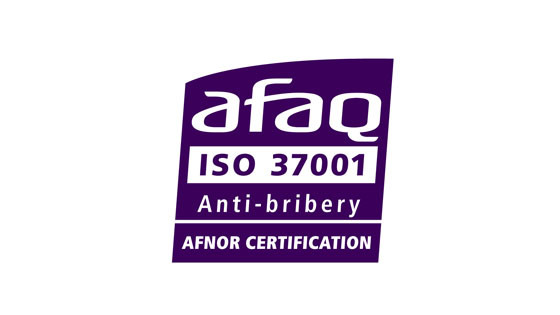Ethics
A process of continuing improvement

The Ethics & Compliance team develops the Alstom Integrity Programme according to a specific approach made of several steps.
Ethics & Compliance Team
First, the Ethics & Compliance Risk assessment is designed to create the most appropriate ethics and compliance programme for Alstom. Regularly updated, it is based on an analysis of Alstom activities and it enables implement all necessary mitigation factors.
Second, the Alstom Integrity Programme implementation refers to all the means put in place to diffuse a culture of integrity within Alstom, which include:
- An independent E&C team;
- An Ethics & Compliance Policy;
- Our Code of Ethics;
- The E&C Alstom Instructions providing guidance and strict rules to employees, especially with regards to Consulting Companies, Joint Ventures and Consortia, Suppliers and Contractors;
- The training with face-to-face training sessions and e-learning programmes which are deployed within the company to explain the Ethics & Compliance policy;
- Communication actions to ensure that employees are well informed about ethics and compliance;
- A community of E&C Ambassadors, all volunteers and coming mainly from the Legal, Finance and HR functions have been appointed to disseminate the Alstom Integrity Culture. They run Ethics & Compliance Awareness sessions and are points of contact for any questions about Ethics & Compliance.
Third, the monitoring and continuous improvement is carried out at both internal and external level. Every year, in the framework of the Yearly Integrity Review, Alstom's top managers report on the implementation of the Alstom Integrity Programme. The E&C team also works closely with the Internal Control and the Internal Audit departments to anticipate and detect risks. And the E&C team is engaged in a certification process of its anti-corruption policy.
Strict Instructions
Alstom complies with all laws and regulations, as well as the international standards that apply to the conduct of business in all countries. Some practices that occur in business environments can put Alstom and its employees at risk. They require clearly defined instructions to guide any of the employees in complying with the law and respecting Alstom's values and rules.
Among these risks, corruption, bribery and influence peddling are defined in accordance with local legislation, but can be broadly defined as follows:
Corruption, bribery and influence peddling are defined in accordance with local law, but these terms may be generally defined as follows:
Corruption and bribery are defined as “the offering, promising, giving, accepting or soliciting of any undue advantage (such as money, gifts or other favors) in order to obtain or retain a business or other improper advantage.” Influence peddling is defined as “the offering or solicitation of an undue advantage in order to exert an improper influence with a view of obtaining from a public official or a decision-maker an undue advantage for the original instigator of the act or for any other person.” On this basis, anti-corruption, combatting these risks, is a key commitment in Alstom’s E&C Policy, and is addressed in our Code of Ethics and several instructions, each dedicated to identified risks.
A culture shift by training and communication
Alstom employees reflect the company's commitment to ethics and compliance. When conducting business on Alstom's behalf, they are responsible for ensuring that their conduct and that of those reporting to them fully comply with the Code of Ethics and all applicable Instructions.
Employees can refer at any time to our Code of Ethics, to the Alstom's Instructions and to a number of resources that are made available on Alstom's intranet. Communication, awareness and training of the managers and employees are essential to adopting good practices and developing ethical conduct.
Combining face to face and distance learning
All employees are made aware of the Alstom's Integrity Programme upon their arrival within the company.
The Ethics & Compliance training offer comprises comprehensive compliance sessions regularly held by the Ethics & Compliance Department. Face to face training sessions (three hour class) are dedicated to delivering deep knowledge and appropriate conduct to employees potentially exposed to difficult professional situations.
Distance learning is based on several modules. The e-Ethics module aims at ensuring that employees understand the principles of the Code of Ethics and targets managers, engineers and professionals for whom it is compulsory when they join Alstom.
Key resources accessible to all employees
A number of communication tools are available to all Alstom employees in order to increase the visibility of the compliance activities such as regular news on Alstom’s internal communications channels.
Spreading the culture of ethics and compliance
Because the Code of Ethics must be known and applied by all, in all circumstances, Alstom has developed a global organisation built on two specific internal networks, assuming the diffusion of the culture of ethics and compliance.
A number of years ago, Alstom created the Ethics & Compliance team, a structure that is responsible for promoting and applying the Code of Ethics within all of the Alstom's locations.
The team includes Ethics & Compliance Officers who report directly to the Chief Compliance Officer. A Legal and Compliance Officer is appointed in each region.
The Ethics & Compliance team is supported by a community of Ethics & Compliance Ambassadors. The E&C Ambassadors are all volunteers whose role is to disseminate Alstom's culture of integrity within the group through Ethics & Compliance Awareness sessions.
The E&C Ambassadors come mainly from the Legal, Finance and HR functions. They have direct contact with the Ethics & Compliance team that provides them with the support and tools necessary to achieve their mission. They are points of contact for any questions about Ethics & Compliance.
Recognised rules and procedures
Alstom ensures that its efforts systematically reflect best practices in terms of compliance and ethics standards and regularly reviews and audits its Integrity Programme.
Maintaining the highest ethics standards
Since 2009, Alstom is engaged in a certification process of its anti-corruption policy. These efforts include a dedicated internal audit plan of E&C processes and outside certifications of our Integrity Programme. In 2017, Alstom has obtained ISO 37001 certification on Anti-bribery Management Systems, an international best practice standard applicable to organisations of all sizes, private or public.

A thorough and rigorous process
The certification has been attributed following a complete and rigorous evaluation of the anti-corruption programme and of its implementation. The audit focused on the adequacy of Alstom’s anti-bribery system according to the standard ISO 37001, in particular its Ethics & Compliance policy, the Code of Ethics, and the various instructions relating to existing anti-corruption procedures and numerous associated training tools.
Each year, the company is audited of several sites in order to confirm the ISO 37001 certification.


